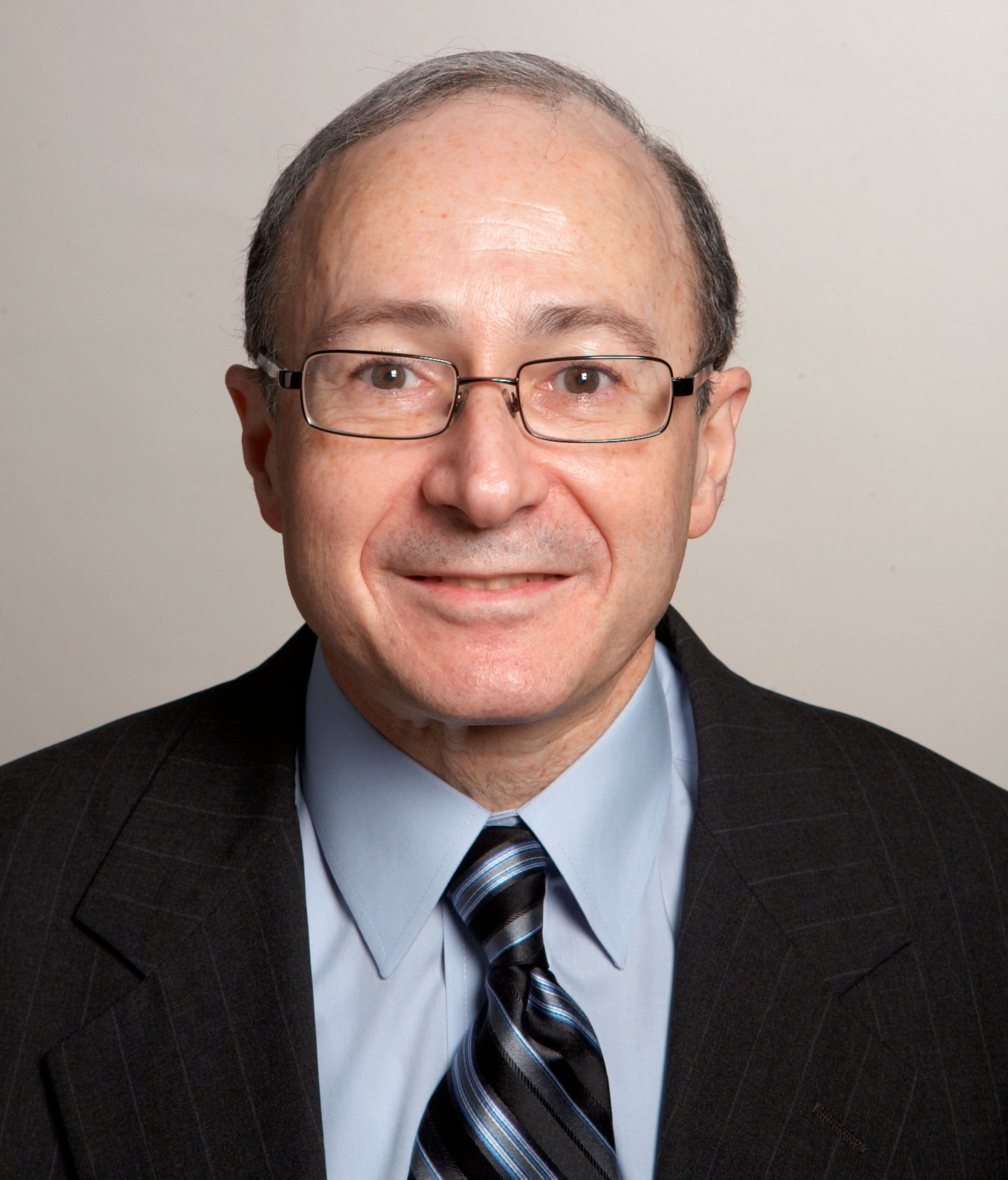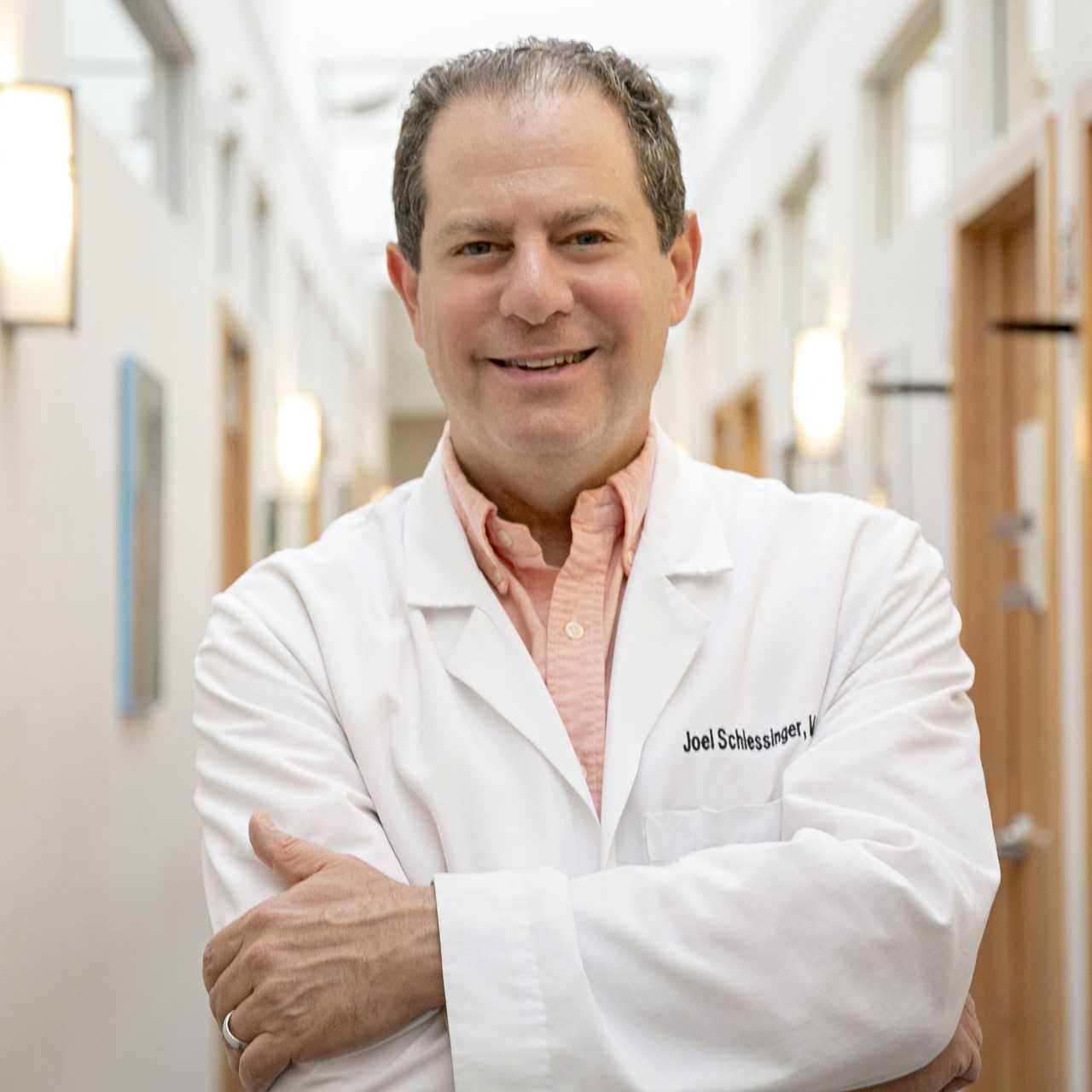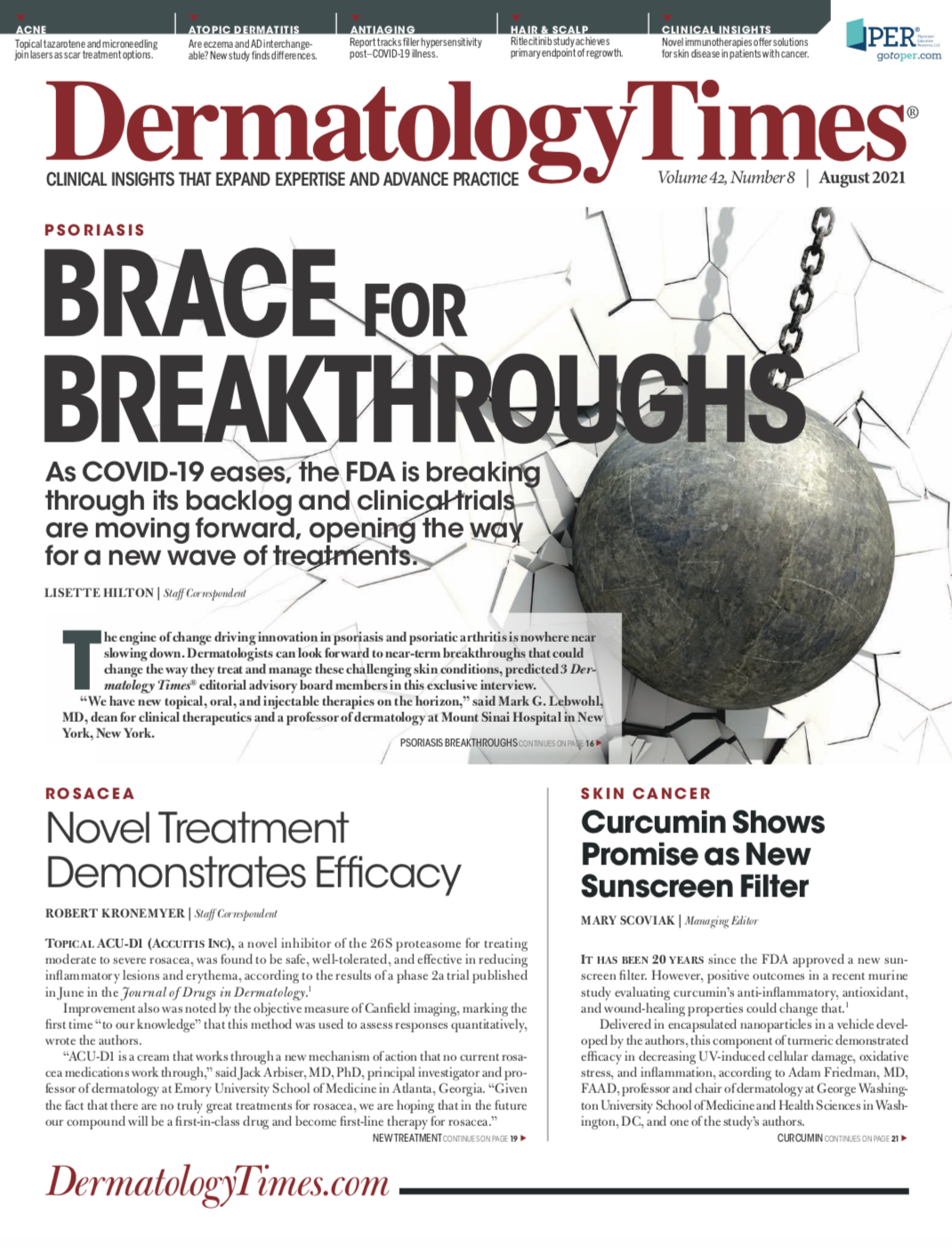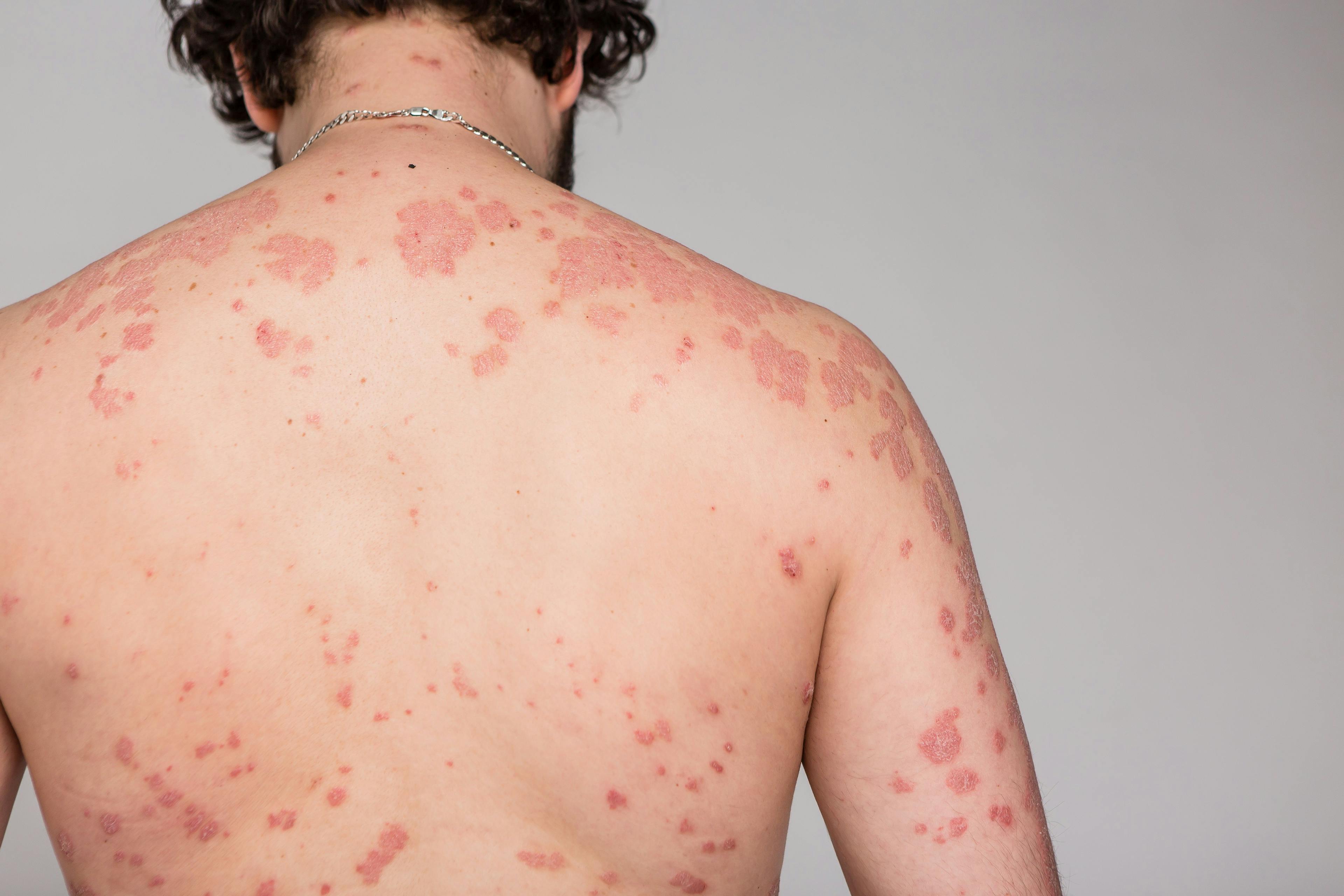- Acne
- Actinic Keratosis
- Aesthetics
- Alopecia
- Atopic Dermatitis
- Buy-and-Bill
- COVID-19
- Case-Based Roundtable
- Chronic Hand Eczema
- Chronic Spontaneous Urticaria
- Drug Watch
- Eczema
- General Dermatology
- Hidradenitis Suppurativa
- Melasma
- NP and PA
- Pediatric Dermatology
- Pigmentary Disorders
- Practice Management
- Precision Medicine and Biologics
- Prurigo Nodularis
- Psoriasis
- Psoriatic Arthritis
- Rare Disease
- Rosacea
- Skin Cancer
- Vitiligo
- Wound Care
Publication
Article
Dermatology Times
Brace for Breakthroughs in Psoriasis, Psoriatic Arthritis
Author(s):
As COVID-19 eases, the FDA is breaking through its backlog and clinical trials are moving forward, opening the way for a new wave of treatments.
The engine of change driving innovation in psoriasis and psoriatic arthritis is nowhere near slowing down. Dermatologists can look forward to near-term breakthroughs that could change the way they treat and manage these challenging skin conditions, predicted 3 Dermatology Times® editorial advisory board members in this exclusive interview.
“We have new topical, oral, and injectable therapies on the horizon,” said Mark G. Lebwohl, MD, dean for clinical therapeutics and a professor of dermatology at Mount Sinai Hospital in New York, New York.
Mark Lebwohl, MD

Topicals that have completed pivotal trials include roflumilast cream (ARQ-151; Arcutis Biotherapeutics) and tapinarof (Dermavant Sciences), he noted.
“In the topical realm for limited disease, we have investigational topical roflumilast,” Lebwohl said. “It’s a phosphodiesterase type 4 inhibitor. It appears to be as effective as some of our stronger steroids but it doesn’t have any steroid [adverse] effects. Actually, it has very few adverse effects altogether.”1
Tapinarof is a first-in-class, small-molecule topical therapeutic aryl hydrocarbon receptor (AhR)-modulating agent, with seemingly good tolerability. Although folliculitis has been reported in a number of patients treated with tapinarof, the adverse effect would not limit its use on any body part, according to Lebwohl.2
Dermavant Sciences announced on June 3 that it had submitted a new drug application to the FDA for tapinarof for the treatment of mild, moderate, and severe plaque psoriasis in adult patients.3
Looking farther ahead, “I suspect in the future we will see topical Janus kinase (JAK) inhibitors coming as well,” Lebwohl said.
Turning to the oral therapy pipeline, Lebwohl said the investigational selective tyrosine kinase 2 (TYK2) inhibitor deucravacitinib (Bristol Myers Squibb [BMS]) appears to be safe. BMS announced earlier this year that results from the first pivotal phase 3 trial evaluating deucravacitinib as an oral treatment for moderate to severe plaque psoriasis showed that it met both coprimary end points vs placebo. The data revealed that significantly more patients treated with this novel oral therapy achieved Psoriasis Area and Severity Index (PASI) 75, defined as at least a 75% improvement of baseline PASI, and a static Physician’s Global Assessment (sPGA) score of clear or almost clear (sPGA 0/1) after 16 weeks of treatment.4
“If approved, it will be the most effective, safe oral medicine that we have—much safer than drugs like methotrexate and cyclosporin,” Lebwohl said. Deucravacitinib also has good efficacy for psoriatic arthritis, but that potential approval is further into the future, he added.
Upadacitinib (Rinvoq; AbbVie), an oral option that could soon be available to psoriatic arthritis patients, also appears to be effective in Lebwohl’s view.
“It is another JAK inhibitor,” he said. “There are other oral JAK inhibitors under investigation, including baricitinib [Olumiant; Eli Lilly and Company], an oral JAK 1/2 inhibitor, which is under development for atopic dermatitis. I suspect it will work quite well for psoriatic arthritis as well.”
The FDA accepted the supplemental new drug application and set a Prescription Drug User Fee Act date for apremilast (Otezla; Amgen). If approved, this would be the first and only approved oral therapy for treating mild to moderate plaque psoriasis in adults. The FDA set December 19, 2021, as the action date. Apremilast is also in phase 3 of a 4-phase trial (DISCREET, NCT03777436) to evaluate its efficacy and safety profiles for treating subjects with moderate to severe genital psoriasis.
Exploring farther into the future, the safety and tolerability of an oral IL-17 small-molecule modulator (LEO Pharma) under development for moderate-to severe psoriasis is in a phase 1 clinical trials (LEO 153339, NCT04883333). Among the promising investigational injectable therapies, bimekizumab (UCB Pharma) is the first bispecific antibody capable of targeting 2 isoforms of IL-17, IL-17A, and IL-17F.
“That’s why bimekizumab has an additional benefit,” Lebwohl said. “In terms of the JAK inhibitors, the TYK2 inhibitor deucravacitinib, in particular, appears to be fairly selective. It blocks the signaling that leads to IL-12 and IL-23, which you would expect would help psoriasis and, sure enough, it does.”
“Bimekizumab is a major breakthrough,” Lebwohl said. “It has results for psoriatic arthritis that exceed what we have seen for all the other biologics. It has results for psoriasis where, for the first time, the majority of patients at the primary end point achieved PASI 100. And this is one of the first times we can say a significant number of psoriatic arthritis patients achieved American College of Rheumatology [ACR] 50 and ACR 70, instead of just ACR 20.”
Investigational biologics spesolimab (Boehringer Ingelheim) and imsidolimab (AnaptysBio) are on the horizon for pustular psoriasis, according to Lebwohl.
“Spesolimab and imsidolimab are dramatically and rapidly effective for pustular psoriasis, which can be a deadly disease,” said Lebwohl, a coauthor of “Newer Therapies in Psoriasis,” published in July 2021 in the Medical Clinics of North America journal.5
Biologics are relatively safe, but there is always room for improvement, according to Joel Schlessinger, MD, FAAD, president of Skin Specialists in Omaha, Nebraska.
Joel Schlessinger, MD, FAAD

“The dramatic improvements in safety that we have already seen are rewarding,” Schlessinger said. “We have nearly 25 years of data that show minimal, if any, signal with respect to cancer, lymphoma, or multiple sclerosis.”
NEW FOR PEDIATRIC PATIENTS
Ixekizumab (Taltz; Eli Lilly and Company), secukinumab (Cosentyx; Novartis), and ustekinumab (Stelara; Janssen Biotech) have been approved for use in children. In addition, data showing the efficacy of adalimumab (Humira; AbbVie) for children have been presented, according to Lebwohl.
Longer-term options may include apremilast as a treatment for pediatric patients aged 6 to 17 years with moderate to severe plaque psoriasis. The drug is now in phase 3b clinical trials (CC-10004-PPSO-004, NCT04175613). This long-term extension phase of a previous study (CC-10004-PPSO-003, NCT03701763) is assessing data for pediatric patients who elect to continue open-label apremilast therapy after completing week 52. The trial’s completion date is set for 2027.
“We are still waiting for the first IL-23 blocker to be approved in children. That of course would have the advantage of very few injections,” Lebwohl noted.
ADVANCES FOR PREGNANT PATIENTS, PEOPLE WITH COMORBIDITIES
Lebwohl pointed to mounting data indicating that biologics used to treat psoriasis and psoriatic arthritis are safe for pregnant women and people with comorbidities.
“The biologics approved to date, like certolizumab [pegol, Cimzia; UCB], either do not cross the placenta or, even though they cross the placenta, have been given to animal models and do not appear to cause birth defects,” Lebwohl said. “We have classes of drugs that block so little of the immune system that we worry less about them. I always try to get patients off any treatment when they are pregnant. But I will say these drugs have such a high level of efficacy and such a good safety profile that my threshold for putting patients on them has gone down substantially.”
Schlessinger is confident that treating pediatric psoriasis with biologics has been studied to a significant degree. But, he noted, pregnancy remains a challenge. Schlessinger does not anticipate seeing enough data to show it is safe to treat pregnant women with biologics anytime soon.
BIOMARKERS AND THEIR VALUE IN PSORIASIS
Future biomarkers may be useful for predicting response to psoriatic arthritis—a solution that is much needed, according to Lebwohl.
“Biomarkers also may be useful for identifying the impact of different drugs on cardiovascular inflammation,” he said.
However, biomarkers predicting response to biologic therapy in psoriasis might not be as valuable because almost 90% of patients achieve PASI 90, Lebwohl added.
DIET, LEAKY GUT, THE MICROBIOME, AND MORE
The diet’s role in psoriasis is controversial, but patients often ask whether gluten-free or Mediterranean diets will help their condition, according to Patricia Farris, MD, owner and dermatologist at Old Metairie Dermatology in Metairie, Louisiana, and cofounder of the Science of Skincare Summit.
Patricia Farris, MD

“Obesity and a high body mass index do seem to increase the incidence and severity of psoriasis and may reduce the response to various treatments including biologics,” Farris said. “Studies have shown that when a low-calorie diet is used in combination with other treatment modalities, there is a greater reduction in PASI scores. So what I tell patients with psoriasis who are overweight is that weight loss using a low-calorie diet is a helpful adjunct therapy for psoriasis.”5
The gut microbiome’s role in psoriasis, however, is less well defined in her view.
“Studies on the gut microbiome in psoriatic patients show varying results, with some studies showing less bacterial diversity and others showing more diversity,” said Farris. “To date, there are no well-controlled studies confirming the benefits of probiotics in patients with psoriasis. Clearly the verdict is out as to whether the gut could be a potential therapeutic target in patients with psoriasis.”6
The theory that leaky gut can trigger autoimmune and inflammatory responses that impact psoriasis deserves more attention and research, according to Schlessinger.
“I routinely discuss this with my patients and encourage them to avoid spicy foods, alcohol, and other irritating substances for their gastrointestinal tract. This has led to a significant improvement in many of my patients,” Schlessinger said. “Even if a nutritionist isn’t consulted, we owe it to each and every one of our psoriasis patients to explore this and inform them of the association.”
Lebwohl is not so sure. He thinks that although there will be advances in atopic dermatitis related to the microbiome, psoriasis patients will be less likely to benefit.
“Initial results that show efficacy in atopic dermatitis are predictable because in atopic dermatitis the skin is colonized with methicillin-sensitive Staphylococcus aureus,” he said. “In psoriasis, patients are not routinely colonized with bacteria and have an increase on the skin of antimicrobial peptides.”
UNFINISHED BUSINESS
No treatments for patients with psoriatic arthritis consistently result in ACR 100. Even ACR 70 is not achieved in the majority of patients with the best drugs available, according to Lebwohl. And more data is needed on whether biologics reduce cardiovascular death rates among those with psoriasis and psoriatic arthritis, he added.
“We have a lot of data from registries pointing to the success of TNF [tumor necrosis factor] blockers in reducing cardiovascular death rates,” Lebwohl said. “We are starting to get some information on IL-17 blockers. The more we get the better, because I think that will move a lot of colleagues to use these very effective, very safe drugs.”
COST REMAINS AN OBSTACLE TO PRESCRIBING BIOLOGICS
One challenge that remains is the high cost of biologics for patients. “That is our politicians’ fault,” Lebwohl said. “A drug for which the pharmaceutical companies want to charge $30,000 costs $100,000 because the insurers and pharmacy benefit managers demand discounts and rebates, which are really payoffs. It should be unacceptable, but politicians haven’t done anything about it yet.”
And unfortunately, Affordable Care Act insurance plans do not pay for some of the advanced new therapies that safely and effectively clear psoriasis in patients, he added.
IS CLEARING A GUARANTEE TODAY?
Not all patients achieve PASI 100. “But when a patient walks in my office and they are very sick, I can look at them with confidence and say, ‘We are going to make you better,’” Lebwohl noted.
Typically, IL-17 blockers, bimekizumab (UCB) among them, work fastest among the biologics to clear psoriasis, according to Lebwohl.
“One of the underutilized drugs that I think makes my patients happy is brodalumab [Siliq; Ortho Dermatologics],” he said. “It has a suicide warning, so many of my colleagues do not use it. However, there are 2-year data showing no suicides. The reason my patients do really well is that when everything else fails, brodalumab works.”7
Of the IL-23 blockers, it appears that risankizumab (Skyrizi; AbbVie) works fairly fast. And although there is some loss of efficacy with some of the biologics, Lebwohl said he has some surprising anecdotal findings in that regard.
“One of the drugs that is probably viewed as the least effective of the IL-23 blockers is tildrakizumab (Ilumya; Sun Dermatology),” he said. “But it turns out that if you keep people on it long enough, its peak efficacy is 6 or 7 months. Many patients clear for years, even after stopping tildrakizumab.”
Schlessinger noted he rarely sees a patient he cannot clear to at least PASI 75 or 90. “Clearly there are areas that are still a struggle and a modest [number] of patients who don’t do well with the current treatments. But we have absolutely crossed the line from the dark ages to the modern era,” he said.
Disclosures:
Lebwohl is an employee of Mount Sinai Hospital and receives research funds from AbbVie, Amgen, Arcutis Biotherapeutics, Boehringer Ingelheim, Dermavant Sciences, Eli Lilly and Company, Incyte, Janssen Research & Development, Leo Pharma, Ortho Dermatologics, Pfizer, and UCB. He is a consultant for Aditum Bio, Allergan, Almirall, Arcutis Biotherapeutics, Avotres Inc, BirchBioMed, BMD Skincare, Boehringer Ingelheim, Bristol Myers Squibb, Cara Therapeutics, Castle Biosciences, Corrona [CorEvitas], Dermavant Sciences, Evelo Biosciences, Facilitate International Dermatologic Education, Foundation for Research and Education in Dermatology, Inozyme Pharma, Kyowa Kirin, Leo Pharma, Meiji Seika Pharma, Menlo Therapeutics, Mitsubishi, Neuroderm, Pfizer, Promius Pharma/Dr Reddy’s Laboratories, Serono, Theravance Biopharma, and Verrica Pharmaceuticals.
Schlessinger is a researcher for Medicis Pharmaceutical, Allergan, Merz Therapeutics, and Mentor.
Farris served as an advisor or consultant for Cassiopea, CeraVe, La Roche Posay, SkinCeuticals, and U.SK Under Skin; owns stock, stock options, or bonds from Nutraceutical Wellness LLC; is cofounder of RegimenMD; and is an injection trainer for Allergan.
References:
- Lebwohl MG, Papp KA, Stein Gold L, et al; ARQ-151 201 Study Investigators. Trial of roflumilast cream for chronic plaque psoriasis. N Engl J Med. 2020;383(3):229-239. doi:10.1056/NEJMoa2000073
- Dermavant submits new drug application (NDA) to FDA for tapinarof cream for the treatment of adults with plaque psoriasis. Press release. Dermavant Sciences. June 3, 2021. Accessed July 9, 2021. https://www.dermavant.com/dermavant-submits-new-nda-to-fda-for-tapinarof-cream/
- Bristol Myers Squibb announces positive topline results from second pivotal phase 3 psoriasis study showing superiority of deucravacitinib compared to placebo and otezla (apremilast). Press release. Bristol Myers Squibb. February 2, 2021. Accessed July 9, 2021. https://news.bms.com/news/details/2021/Bristol-Myers-Squibb-Announces-Positive-Topline-Results-from-Second-Pivotal-Phase-3-Psoriasis-Study-Showing-Superiority-of-Deucravacitinib-Compared-to-Placebo-and-Otezla-apremilast/default.aspx
- Marson JW, Snyder ML, Lebwohl MG. Newer therapies in psoriasis. Med Clin North Am. 2021;105(4):627-641. doi:10.1016/j.mcna.2021.04.004
- Debbaneh M, Millsop JW, Bhatia BK, Koo J, Liao W. Diet and psoriasis, part I: impact of weight loss interventions. J Am Acad Dermatol. 2014;71(1):133-140. doi:10.1016/j.jaad.2014.02.012
- Ellis SR, Nguyen M, Vaughn AR, et al. The skin and gut microbiome and its role in common dermatologic conditions. Microorganisms. 2019;7(11):550. doi:10.3390/microorganisms7110550
- Lebwohl M, Leonardi C, Wu JJ, et al. Two-year US pharmacovigilance report on brodalumab. Dermatol Ther (Heidelb). 2021;11(1):173-180. doi:10.1007/s13555-020-00472-x

Newsletter
Like what you’re reading? Subscribe to Dermatology Times for weekly updates on therapies, innovations, and real-world practice tips.





















